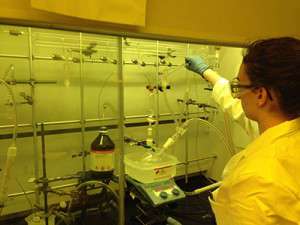Major: Biochemistry and Molecular Biology
Minor: Mathematics
“New Generation Dental Resin Composites”

In the USA alone, 122.7 million dental resin composite restorations were placed in 2006, an increase of about 40 percent from 1999 (ADA Health Resources Policy Survey). The current trend in clinical dentistry indicates that this number is likely to increase. Many if not most of the currently available materials and their accompanying instructions for use do not produce satisfactory durability and esthetics over time. The short average service life of these systems and concerns regarding leached unreacted monomers, and possibly bisphenol A (BPA), and degradation products from these systems are evincing a need for new, long lasting composite polymers, fillers and adhesive components to improve the dental and oral health of dental patients everywhere. Here, I present the concept of novel dental resins as sealants, resin matrix, and dental adhesives that are superior in properties and endurance to current BisGMA/TEGDMA resin systems. The durability of the new resins will be improved by replacing the hydrolyzable ester groups in BisGMA/TEGDMA systems with hydrolytically stable ether groups. New resin monomers that are not susceptible toward enzymatic or hydrolytic degradation were synthesized and characterized. In addition, new initiator systems were tested, and many combinations of different resin monomers were examined to achieve requirements for clinical practice.

How did you find out that you could do research in your field in the summer?
I heard about the National Institute of Standards and Technology (NIST) program from a friend who had participated previously. On the NIST website I found research topics in my field.
How did you know that research at NIST was what you wanted to do?
I wanted to get more experience with chemistry research because I hope to go to graduate school for a Ph.D. in chemistry. NIST offered me a great opportunity to get more chemistry laboratory experience.
Was the application difficult to do? Did you have help with this?The application was very easy to do, with the help from the Office of Undergraduate Education.
What was your summer research project?
I worked with the American Dental Association (ADA) Foundation at NIST on synthesis and characterization of new monomers to be used in dental composites, as well as optimization of polymerization conditions for these monomers.
Who was your mentor for this project?
My mentor was Dr. Jirun Sun.
How much time do you put into this work? Were you paid? Where did you live?
I worked full time (~8 hrs/day) for 11 weeks. I was paid a stipend of $5500 and housing was provided at a hotel near the NIST campus in Gaithersburg.
What academic background did you have before you started?
My academic background included many courses in biology, chemistry, and math. The most relevant courses to my project were Organic Chemistry I/II/lab, Analytical Chemistry, and Mechanisms of Organic Reactions.
How did you learn what you needed to know for this project?
I was trained by a postdoc (Dr. Andres Gonzalez-Bonet) who was also working with my advisor on development of new monomers. He taught me the synthesis/purification procedure and characterization techniques for the monomers and polymers, including NMR and IR spectroscopy.
What was the hardest part about your research?
Making new monomers is a long process that requires a lot of time for synthesis, extraction, purification, and characterization. I was always eager to move on to the next part of the project plan, but I spent a lot of time repeating the same procedures or experiments. I wish I could have spent more than just 11 weeks on the project.
What was the most unexpected thing?
My whole project was unexpected; I couldn’t tell what exactly I would be doing from the project description. On my first day I found out I would get to do synthesis and spectroscopy, which I had not expected. I was very excited about this, since it was exactly the type of research experience I was hoping for when I applied to summer programs.
How does this research relate to your course work at UMBC?
I take many upper-level chemistry classes that are related to organic chemistry. My research taught me a lot about organic chemistry and spectroscopy, which will be useful in my classes. I also couldn’t have done so well at NIST if I didn’t have the strong chemistry background I got from my UMBC classes.
What is your advice to other students about getting involved in research?
Try not to reject a good opportunity based on a project description. I was not sure if my project at NIST would be something that I would enjoy, but I knew I would love it as soon as I learned more about the topic and the specific tasks I would be doing. Besides, there is usually flexibility in your project plan.
What are your career goals?
I plan to attend graduate school for a PhD in chemistry with a focus in chemical biology and to pursue a career in research.
8/25/2021